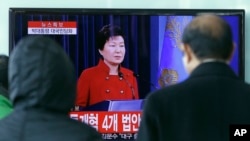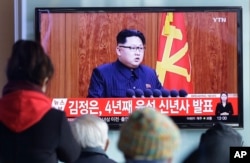South Korean legislators failed to hold a vote this week on a proposed North Korean Human Rights Act, despite an agreement between the two major political parties to consider the measure.
The legislation, first proposed in 2005, reportedly mandated that future humanitarian aid and cooperation projects be linked to human rights improvements in the North. But it remains a divisive issue in the South Korean parliament where opponents argue it would obstruct any possibility for improving inter-Korean relations.
Divisive aspects of bill
Earlier this week, it appeared a consensus had been reached when reports said the ruling Saenuri Party of President Park Geun-hye and the opposition Minjoo Party had reached a breakthrough deal to consider legislation intended to hold the Kim Jong Un government accountable for alleged widespread abuses.
“One of the reasons the bill was not on the [legislative] agenda is that there is a gap in positions between the majority party and the opposition party on whether inter-Korean relations should be addressed in the bill or not,” said activist Choi Yong-sang, with the Network for North Korean Human Rights.
Another controversial aspect of the bill was that it would include financial support for organizations that actively work to undermine the Kim Jong Un government, including North Korean defector groups that regularly send anti-Kim propaganda leaflets across the border.
“Everybody around the world has been getting tough on North Korea, and in South Korea there has been this political divide that prevents them from taking the sort of actions you would expect to have occurred a long time ago,” said Phil Robertson, Human Rights Watch's deputy director for Asia.
In 2014, the U.N. General Assembly backed a resolution to refer North Korea to the International Criminal Court (ICC) for crimes against humanity, based on an extensive U.N. human rights report that documented ongoing and systematic atrocities including a network of political prisons, murder, enslavement, torture, imprisonment, rape, forced abortions and other sexual violence.
Critics of the bill recognize the extreme severity of the atrocities committed by the highly restrictive, authoritarian North Korean government, but disagree that publicly confronting the leadership on this issue will force them to change.
“It is impossible to improve the situation by the idea of calling Kim Jong Un to the ICC. It is necessary to approach North Korea with specific action plans such as proposing to demolish the criminal camps owned and operated by North Korea within five years, step by step,” said political analyst Cheong Seong-chang with the Sejong Institute.
Inter-Korean relations
However, any prospects for improving inter-Korean relations have faded in the wake of North Korea’s fourth nuclear test conducted on January 6. And there is increased public support in South Korea for harsh economic sanctions to further isolate and punish Pyongyang and heighten military readiness to respond to any provocations.
“I think the people who have been arguing for engagement with North Korea have frankly very little to show either in terms of peace or in terms of improvement of human rights,” said Robertson.
Parliamentary procedures may have also played a part in undermining the legislative initiative. Even though the Saenuri Party holds 158 of the 300 seats in the Assembly, the speaker needs the support of 60 percent of lawmakers to bring a bill up for a vote. Also, analysts speculate that with elections pending in April, the opposition could be holding up the human rights bill and other measures supported by the Park government until it agrees to pass redistricting legislation.
Youmi Kim in Seoul contributed to this report.







